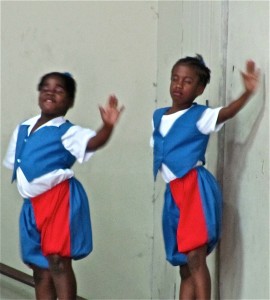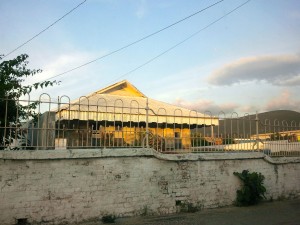
Does Kingston Deserve Its Bad Reputation?
December 27th, 2016
I am currently reading a book – a sort of cultural/historical tour of the Caribbean islands – which attempts to find a “common Caribbean culture.” I plan to write a review of it shortly. The chapters on Jamaica were disappointing. Jamaica does consist of more than tourist resorts (Rastafarians and tourists) and Kingston (gangsters). Is this a true representation of Jamaican culture, and its people? I hardly think so. By the way, the book is called Island People: The Caribbean and the World by Joshua Jelly-Schapiro. It was published a few weeks ago.
The book’s almost entirely negative portrayal of the city I live in gave me food for thought. Is this really justified? Sure, Kingston (like almost every city, anywhere) has its dark side; it has its slums, ravaged by past conflicts and some current ones too. But Kingston has moved on – as cities tend to do. Life goes on, day to day. Kingston is not mired in the past. In fact, Kingstonians look eagerly towards the future. I find people are generally optimistic and pushing ahead.
There is a general need for “law and order” in the city (this is a common complaint across the country). These are the “little” things that truly matter – traffic, garbage collection, air pollution, noise pollution – that would hugely improve city dwellers’ quality of life and our relationships with each other. People who live in cities are often not easy-going, even aggressive, and Kingston is no exception. But there are many ways in which we could make each others’ lives better, whether uptown or downtown, perhaps summed up by the hackneyed phrase “community spirit.” We can continue to work on that in the New Year.
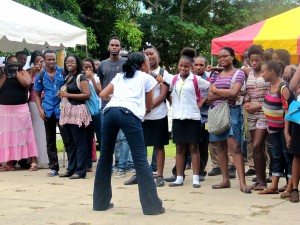
Kingston energy: A performer with ASHE engages the audience at a World AIDS Day awareness event. (My photo)
This takes me to the critical point: Crime. This is how Kingston earned its grim reputation. In my blog this week, I looked at the horrifyingly long list of murders across the island (around 30 reported in the past 10 days, and I may have missed some). To my surprise, I noticed there was not one murder in Kingston/St. Andrew during the period December 16 – 26; over half took place in western Jamaica, especially in the parish of St. James. Of course, crime is not only about murders; we must consider other serious crimes such as rape, and the raft of petty crimes. Indeed, Kingston is like any other city. You have to be aware of your surroundings, especially if walking on the street, on public transport or in an unfamiliar part of town. Street robberies are quite frequent, but we tend to know the “hot spots” and the warning signs.
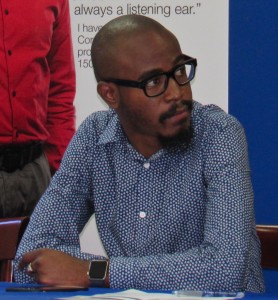
Kingston ambition: Young media entrepreneur Tyrone Wilson is an example of the growing small business culture in Kingston. (My photo)
As I thought about the sad situations that brought about this homicidal wave over the holiday period, it crossed my mind that perhaps we should be more concerned about the rural areas than the city. What is happening in these social spaces, in families – where a 19 year-old girl is killed by a jealous boyfriend, and a young man who goes to visit his four year-old daughter at her grandparents’ home gets into an argument and is killed by the grandfather? The focus is always on “what’s happening in Kingston.” But what is happening in our rural districts?
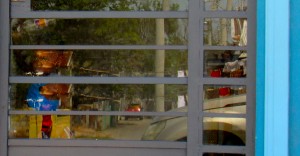
Kingston youth: A boy peers through the window of the Community Centre in Rose Town, a project of the Prince’s Foundation for the Built Environment. (My photo)
Now, on a beautiful post-Christmas morning in Kingston, I can hear the distant sounds of a sound system, and the voices of children playing. Although I live in a comfortable residential part of town, I know this is happening across the city. Although it’s a holiday, some businesses are open and making a little money. Yes, we need more jobs, especially for our women; yes, we need more and better quality education and more opportunities, especially for our young people. We need more environmental awareness and civic pride, always. We need to care more about our city.
Yet – having said all that, all in all, Kingston is not a bad place to live. So please, give us a little more love!
Tags: Caribbean, crime and violence, entrepreneurs, Island People, Jamaica, Joshua Jelly-Schapiro, Kingston, law and order, murder, sustainable development, tourism
The Gleaner reserves the right not to publish comments that may be deemed libelous, derogatory or indecent.
To respond to The Gleaner please use the feedback form.
- We Are the Zoomers
- Living Online with Humans and Birds: NAOC 2020
- Human Trafficking and the Problem of Public Education
- Down Memory Lane
- Are We Ready to Recover from COVID-19?
- Road Safety Matters: Is Your Vehicle Safe?
- Sexual Harassment, Me Too, and the Minister’s Disturbing Giggle
- The Vulnerable Senior Citizens, Private Care Homes and COVID-19
- A Muddle Over Masks
- Here is Something Life-Saving You Can Do: Give Blood!

